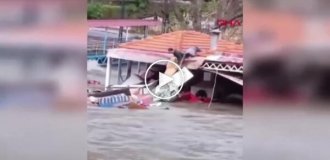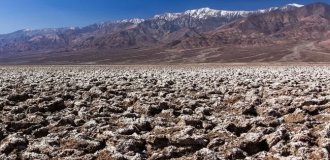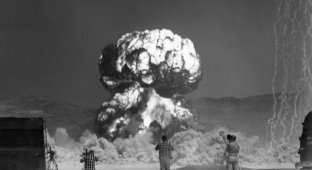Three people who saved millions (1 photo)
Only five days after the explosion, on May 1, 1986, Soviet authorities at Chernobyl made a terrible discovery: the core of the exploded reactor was still melting. The core contained 185 tons of nuclear fuel, and the nuclear reaction continued at a terrifying rate.
Beneath these 185 tons of molten nuclear material was a reservoir containing five million gallons of water. Water was used as a coolant in the power plant, and the only thing separating the melting reactor core from the water was a thick concrete slab. The melting core slowly burned through this plate, descending to the water in a smoldering stream of molten radioactive metal.

If this white-hot, melting reactor core touched the water, it would cause a massive, radiation-laden steam explosion. The result could be radioactive contamination of most of Europe. Based on the death toll, the first Chernobyl explosion would have looked like a minor incident.
Thus, journalist Stephen McGinty wrote: “This would have entailed a nuclear explosion, which, according to Soviet physicists, would have caused the evaporation of fuel in three other reactors, leveled 200 square kilometers [77 square miles], and destroyed Kiev , contaminated the water supply used by 30 million people and made northern Ukraine uninhabitable for more than a century” (The Scotsman March 16, 2011).
The School of Russian and Asian Studies in 2009 made an even more grim assessment: if the reactor's melting core had reached the water, the ensuing explosion "would have destroyed half of Europe and rendered Europe, Ukraine and parts of Russia uninhabitable for approximately 500,000 years."
Experts working on the spot saw that the melting core was devouring that very concrete slab, burning through it - getting closer to the water every minute.
Engineers immediately developed a plan to prevent possible explosions of the remaining reactors. It was decided that three people would go through the flooded chambers of the fourth reactor in scuba gear. When they reach the coolant, they will find a pair of shut-off valves and open them so that the water completely flows out before the reactor core comes into contact with it.
For millions of people in the USSR and Europeans who faced imminent death, illness and other damage due to the impending explosion, this was an excellent plan.
The same could not be said about the divers themselves. There was no worse place on the planet then than a water tank under the slowly melting fourth reactor. Everyone understood perfectly well that anyone who fell into this radioactive brew would be able to live long enough to complete their work, but, perhaps, no more.
Soviet authorities explained the circumstances of the impending second explosion, the plan to prevent it and the consequences: in essence, it was inevitable death from radiation poisoning.
Three people volunteered.
The three men volunteered their help, knowing that it would likely be the last thing they would do in their lives. These were a senior engineer, a mid-level engineer and a shift supervisor. The shift supervisor's job was to hold the underwater lamp so that the engineers could identify the valves that needed to be opened.
The next day, the Chernobyl trio put on their gear and plunged into the deadly pool.
The pool was pitch black, and the light from the shift supervisor's waterproof lantern was reportedly dim and intermittently extinguished.
We moved forward in the muddy darkness, the search did not bring results. The divers sought to complete the radioactive voyage as quickly as possible: every minute of the dive, isotopes freely destroyed their bodies. But they still haven't found the drain valves. And so they continued their search, even though the light could go out at any moment, and darkness could close over them.
The lantern did burn out, but this happened after its beam had picked out a pipe from the darkness. The engineers noticed her. They knew that the pipe led to those valves.
The divers swam in the dark to the place where they saw the pipe. They grabbed onto it and began to rise, grabbing it with their hands. There was no light. There was no protection from radioactive ionization, which is harmful to the human body. But there, in the darkness, there were two valves that could save millions of people.
The divers opened them and water poured out. The pool began to empty quickly.
When the three men returned to the surface, their job was done. Nuclear power plant employees and soldiers greeted them as heroes, which they truly were. They say that people literally jumped for joy.
Over the next day, all five million gallons of radioactive water leaked from beneath reactor four. By the time the melting core located above the pool made its way to the reservoir, there was no longer any water in it. A second explosion was avoided.
The results of the analyzes carried out after this dive agreed on one thing: if the trio had not plunged into the pool and drained it, millions of people would have died from a steam explosion that would have changed the course of history.
Over the next few days, the three began to exhibit inevitable and unmistakable symptoms: radiation sickness. After several weeks, all three died.
The men were buried in lead coffins with sealed lids. Even deprived of life, their bodies were thoroughly saturated with radioactive radiation.
Many heroes went to great lengths for the sake of others, having only a small chance of survival. But these three men knew that they had no chance. They peered into the depths where certain death awaited them. And they plunged into them.
Their names were Alexey Ananenko, Valery Bespalov and Boris Baranov.
Three people who saved millions.






















